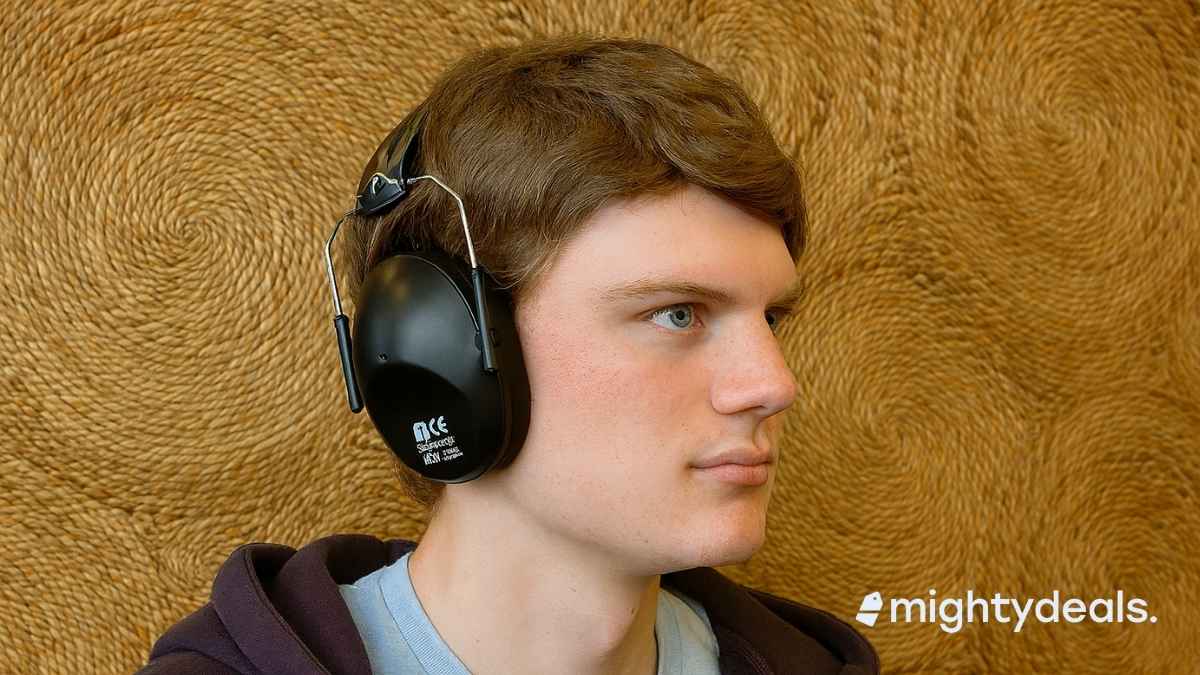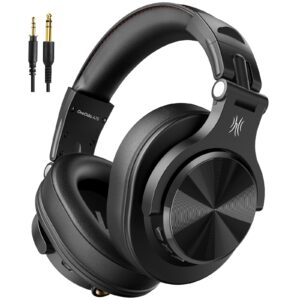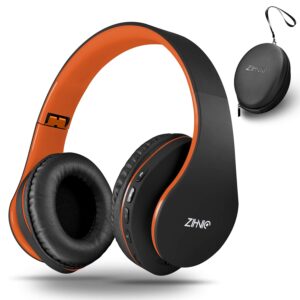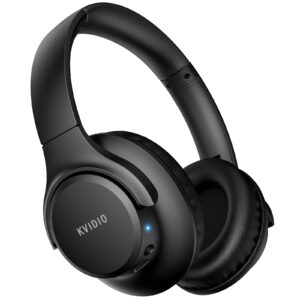We independently select all products and services. If you click through links we provide, Mighty Deals may earn a commission.
Many autistic adults find certain environments overwhelming because of loud or unpredictable sounds. Headphones can help manage sensory input by reducing background noise and providing a sense of control and calm. For some, the right headphones are an essential support tool for work, travel, or simply spending time in busy spaces.
When it comes to selecting headphones for autistic adults, comfort is just as important as sound quality. Lightweight materials, adjustable headbands, and soft ear cushions can make a big difference during long wear. Effective noise reduction, whether through passive padding or active noise cancellation, also matters, as it can help block distracting or distressing noises.
It’s important to consider how easy the headphones are to use and maintain, since buttons, connectivity, and cleaning can all affect how helpful and practical they are for daily use. We spent hours researching the top models and testing them in real-life situations to find the best headphones for autistic adults.
Best Headphones for Autistic Adults
We understand how important comfortable and reliable headphones can be for autistic adults. Our team reviewed various options to help block out noise and improve daily comfort. Here are our top recommendations.
1. OneOdio A70 Bluetooth Headphones
Those seeking a comfortable, versatile, and budget-friendly over-ear headphone for sensory relief and everyday use will find the OneOdio A70 a practical choice.
Pros
- Extremely cushioned and gentle on the head for all-day comfort
- Dual wired and wireless use gives flexibility and peace of mind
- Impressive battery life for long periods between charges
Cons
- Does not block out as much noise as active noise-cancelling models
- A bit bulky if you want a truly compact headset
- Button controls can feel slightly awkward at first
The OneOdio A70 feels sturdy right out of the box, and the soft ear pads are a noticeable benefit if we’re wearing them for hours—especially for anyone sensitive to pressure or uncomfortable materials. Adjusting the headband and folding them up for storage is smooth, which makes them hassle-free to carry in a bag or travel with.
Switching from Bluetooth to a wired connection is simple and helps us avoid worries about running out of battery during a stressful moment. The included cables make it easy to hook up to a laptop, tablet, or even music equipment, which is helpful for both relaxation and focus.
We appreciate how the sound comes through clean and dynamic, with enough bass to be soothing without feeling overwhelming. On the other hand, these headphones don’t block external noise as much as some other options, which may be important if we’re easily distracted by background sounds. The ability to share music with a friend or therapist is a useful bonus, though, and the long battery life keeps us from constantly needing to recharge.
2. ZIHNIC Bluetooth Over-Ear Headphones
These headphones are a good option for autistic adults who want comfort and a calm listening experience at an affordable price.
Pros
- Soft, padded earcups are gentle on the head for long hours
- Foldable and lightweight; easy to bring anywhere
- Blocks out most background noise, making it easier to focus
Cons
- Bluetooth microphone can sound muffled on calls
- Battery lasts for several days but not all week
- Only connects to one device at a time
We found the comfort level of these ZIHNIC headphones stands out, especially for prolonged use. The earcups don’t squeeze or irritate, and the padding is soft enough that we almost forget we’re wearing them. Folding them up and stashing them in the included case is convenient for travel or downtime between appointments.
Whenever we want some relief from noisy environments, these headphones offer solid noise isolation. They don’t create complete silence, but routine sounds fade into the background which helps block out overwhelming sensory input. The sound quality is clear and strong even at lower volumes, so we don’t have to turn them up too loud to enjoy music or podcasts.
Switching between wireless and wired mode is quick, which is helpful if we forget to charge. The battery does need charging every few days if we use them heavily, and the microphone is best for short calls rather than long meetings. They pair easily with smartphones and laptops but only link to one at a time, so swapping devices takes an extra step.
For those of us looking for an affordable, comfortable headphone that helps manage sound sensitivity, the ZIHNIC Bluetooth Over-Ear Headphones deliver on the basics without unnecessary complications.
3. KVIDIO Bluetooth Headphones
If comfort and long-lasting battery life matter most for sensory needs, these headphones are a practical choice.
Pros
- Lightweight and easy to wear for hours
- Simple pairing and reliable wireless performance
- Folds down small for travel or commuting
Cons
- No active noise cancellation
- Earpads can feel snug for larger ears
- Audio leaks a bit at higher volumes
We found the KVIDIO headphones comfortable to wear throughout an entire day, thanks to their lightweight frame and soft padding. Adjustments are straightforward and the headband doesn’t squeeze, which helps avoid sensory overload. They fold up neatly and barely add any weight to a bag, so taking them on-the-go feels effortless.
Connecting them to different devices was hassle-free, working well with both Bluetooth and the backup cable. We appreciated that the battery lasted for days of regular use, making it easy to forget about charging. The wireless range covered our home workspace, so we could step away from our desk without losing connection.
Sound isolation is decent, but not as strong as models designed specifically for blocking outside noise. For phone calls, voices came through fine, but the microphone performance could be better in noisy environments. If quiet immersion isn’t a priority, these headphones deliver solid value for everyday listening needs.
4. BERIBES Bluetooth Headphones
For autistic adults looking for comfort, sound quality, and long battery life without spending a fortune, these headphones are a solid option.
Pros
- Exceptionally lightweight and comfortable for long listening sessions
- Impressive battery life that actually lasts days between charges
- Multiple sound modes let us adjust audio easily based on our needs
Cons
- The sound isolation isn’t as strong as true noise-canceling models
- Sometimes the fit can feel loose on smaller heads
- Buttons could be easier to find by touch
After trying these BERIBES headphones, we found the comfort level stood out right away. The ear cushions are soft, don’t press too hard, and never made our ears ache, even after a full day of use. Switching between different music modes made it easy to find a sound profile that worked for sensitive ears or calming background music.
We appreciated being able to go days, not just hours, before having to recharge. The battery life really does make a difference for those of us who rely on our headphones to provide a break from overwhelming sounds in public or busy places. They’re lightweight enough that we barely noticed them on our heads, even after hours of wear.
Connecting to devices is fast and reliable. We like that we can pair with two devices at once—helpful if we need to take a call while using a tablet or laptop. While these headphones block out a lot of ambient noise, they don’t completely cut it out, so they’re best for quieter environments or as an everyday option for reducing but not eliminating distractions.
Overall, BERIBES Bluetooth Headphones make a practical choice for autistic adults who value comfort and flexibility above all.
Buying Guide
When looking for headphones, we should start by considering comfort. Cushioned ear pads and adjustable headbands help us wear them longer without discomfort.
Noise reduction can make a big difference. Active noise cancellation (ANC) filters out background sounds, while passive noise isolation relies on the headphone design to block noise.
Let’s think about how we will use our headphones. Do we need them for travel, work, or at home? Some options are lightweight and foldable for easy carrying.
We might prefer wired or wireless headphones. Wired models avoid battery concerns, while wireless headphones offer more freedom of movement.
Volume limiting is a helpful feature. It prevents us from listening at volumes that could cause discomfort or harm.
Here’s a brief comparison of features we might look for:
| Feature | What It Does |
|---|---|
| Cushioned Earpads | Increases comfort for longer wear |
| Adjustable Headband | Fits more head sizes |
| Noise Cancellation | Reduces background distractions |
| Volume Limiting | Prevents accidental loud sounds |
| Foldable Design | Easier to store and transport |
| Wireless Capability | Allows movement without cables |
Choosing headphones that are easy to clean is helpful too. Some offer removable pads so we can keep them fresh.
We should check for simple controls. Big buttons or sliders are often easier for all of us to use.
Frequently Asked Questions
We understand that adults with autism often need headphones tailored to unique auditory preferences. Sensory sensitivities, comfort, and access to the right features play a major role in finding the best headphones.
What types of headphones are most effective for adults with sensory processing sensitivities?
Over-ear and noise-cancelling headphones are the most commonly recommended. These headphones help block out unwanted sounds. Some people also find soft ear cushions more comfortable for longer use.
How do noise-cancelling headphones benefit adults on the autism spectrum with auditory sensitivities?
Noise-cancelling headphones reduce background noise, making it easier to focus and feel calm. They can help us filter out sounds that cause discomfort in busy environments. This reduces stress in places like supermarkets, public transit, or offices.
Are there specific headphone brands that are recommended for adults with autism for reducing sensory overload?
Brands frequently mentioned for sensory support include Bose, Sony, and Sennheiser. These brands offer reliable noise-cancelling features. Some users also mention Loop and Puro Sound Labs for their comfortable fit and good noise reduction.
What features should be considered when selecting headphones for an autistic adult’s needs?
Soft, cushioned ear pads and adjustable headbands offer better comfort. Long battery life and easy-to-use controls are helpful as well. Wireless models give us more freedom of movement.
Can adults with autism get specialized headphones at no cost, and if so, how?
Some nonprofits, local autism organizations, and schools may provide free or subsidized headphones. It’s best to check with local disability services or advocacy groups. Sometimes, health insurance may cover sensory aids with a recommendation from a specialist.
What are the experiences and recommendations shared on forums like Reddit regarding headphones for autistic adults?
Reddit users often share personal success with brands like Bose QuietComfort and Sony WH-1000XM series. Many recommend trying headphones in-store to test comfort. Budget options, such as Anker Soundcore, also receive positive feedback for solid noise reduction.





